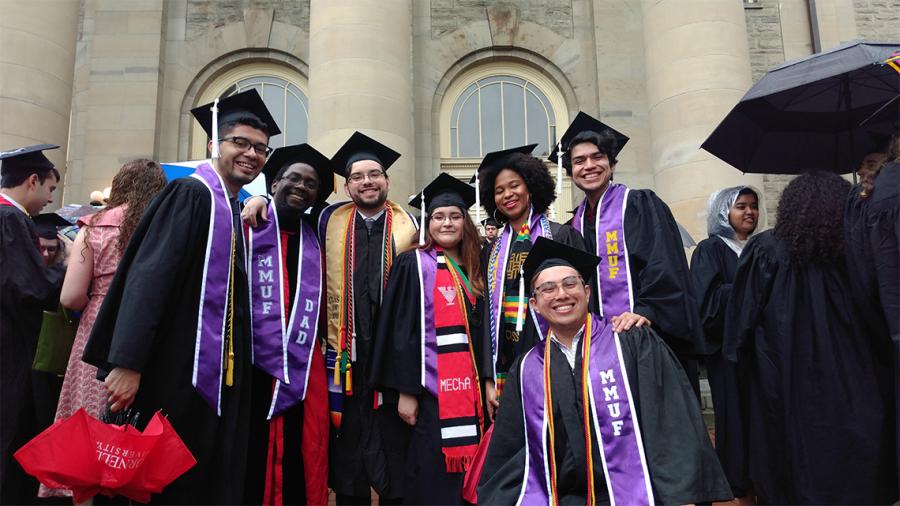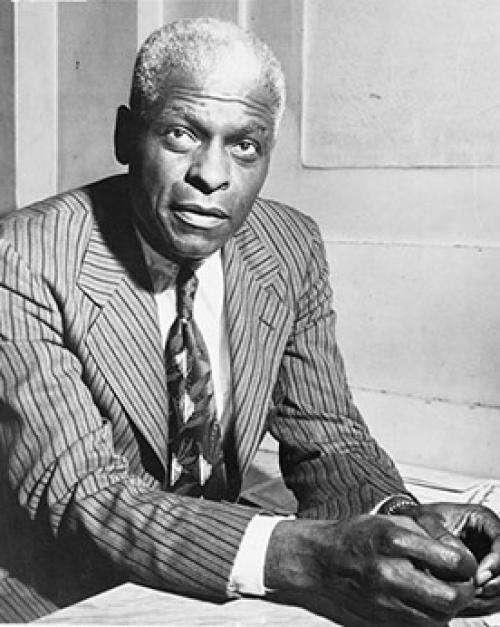Expanding access to and opportunities in the US academy and shaping the future of the humanities
Established in 1988, the Mellon Mays Undergraduate Fellowship (MMUF - Mellon Mays Undergraduate Fellowship | Mellon Foundation) is committed to expanding academic faculties and leadership in higher education and to promoting the value of the humanities and related disciplines. Its name honors Dr. Benjamin E. Mays, the noted African American educator, statesman, minister, and former president of Morehouse College.
Each year, new MMUF undergraduate fellows are selected from applicants in the rising junior classes of MMUF member institutions. These fellows join the rising and graduating senior fellows. The MMUF fellows are provided with mentoring and financial support as they prepare for entry into PhD programs and eventual careers as scholars and faculty members.
Nationally the MMUF program has produced more than 1,100 PhDs. Almost 800 are currently college professors and 300 have taken their humanities training into venues ranging from museums to nonprofit organizations to publishing houses to government positions. At any given time, about 800 MMUF fellows are enrolled in PhD programs. The national fellowship supports approximately 500 undergraduate students each year.
Core Components
Research: Each undergraduate fellow is required to conduct an individual research project under the guidance of a faculty mentor. Guided research is a foundation of MMUF and provides the opportunity to prepare for advanced scholarly work.
Mentoring: Each Mellon fellow is paired with a faculty mentor, with whom they are expected to meet on a regular basis. Students work with their mentors to develop their scholarly interests into research directions.
Meetings/Workshops: During our two meetings per month, students come together to present their research, exchange ideas and discuss various topics related to academic life and preparation for graduate school. Workshops are conducted on topics such as taking the GRE, writing and research, presenting at academic conferences and applying to graduate school.
Conferences and Publication: Fellows will attend and present their research at the MMUF annual conferences. Conference attendance provides invaluable professional development and networking experience. Fellows are also encouraged to submit their research papers for publication in the Mellon Mays Undergraduate Fellowship Journal.
Research Prize: Fellows receive funding during the academic year so that they may have more time to focus on their academic work and research. Summer funds are also awarded to conduct research and to travel.
Eligibility
- Academic promise (3.0 GPA or better)
- Interest in pursuing an academic career in an eligible field
- Demonstrated commitment to the goals of MMUF
- Availability for, and commitment to, full and enthusiastic participation in all aspects of the MMUF program, including attendance at conferences and meetings
Designated Fields
- Anthropology and Archaeology
- Area/Cultural/Ethnic/Gender Studies
- Art History
- Classics
- Geography and Population Studies
- English
- Film, Cinema and Media Studies (theoretical focus)
- Musicology, Ethnomusicology and Music Theory
- Foreign Languages and Literatures
- History
- Linguistics
- Literature
- Performance Studies (theoretical focus)
- Philosophy and Political Theory
- Religion and Theology
- Sociology
- Theater (theoretical focus)
Important Dates and Forms
The current application cycle has closed. Please check back at the end of the fall 2025 semester for future application deadlines.
MMUF Info Sessions:
- The next informational sessions will be scheduled in early 2026 in preparation for the next application cycle to be held in spring 2026.
- Interested A&S sophomores and juniors will have a chance to meet program staff and current Mellon Fellows.
You may also be nominated to apply by a Cornell faculty member. If so, you’ll receive a letter encouraging you to apply to the program.
When applying, you will be asked to fill out an application that requires letters of recommendation and two essays.
Links to additional forms:
- Loan repayment form (for fellows currently in graduate school)
Program Contacts
Mary Pat Brady
Professor, Department of Literatures in English
Faculty Director, Cornell's Mellon Mays Undergraduate Fellowship Program
Faculty Director, American Studies Program
Cornell University
250 Goldwin Smith Hall
Ithaca, NY 14853
mpb23@cornell.edu
Office of Student Services and Admissions
KG17 Klarman Hall
as-studentservices@cornell.edu
About Benjamin Mays
Benjamin Elijah Mays (1895-1984) was an educator, college president, and civil rights activist. His tenacious stand against racial discrimination and broad social vision inspired Martin Luther King, Jr.; his commitment to education earned Mays 49 honorary degrees. Read more about Benjamin Mays.

